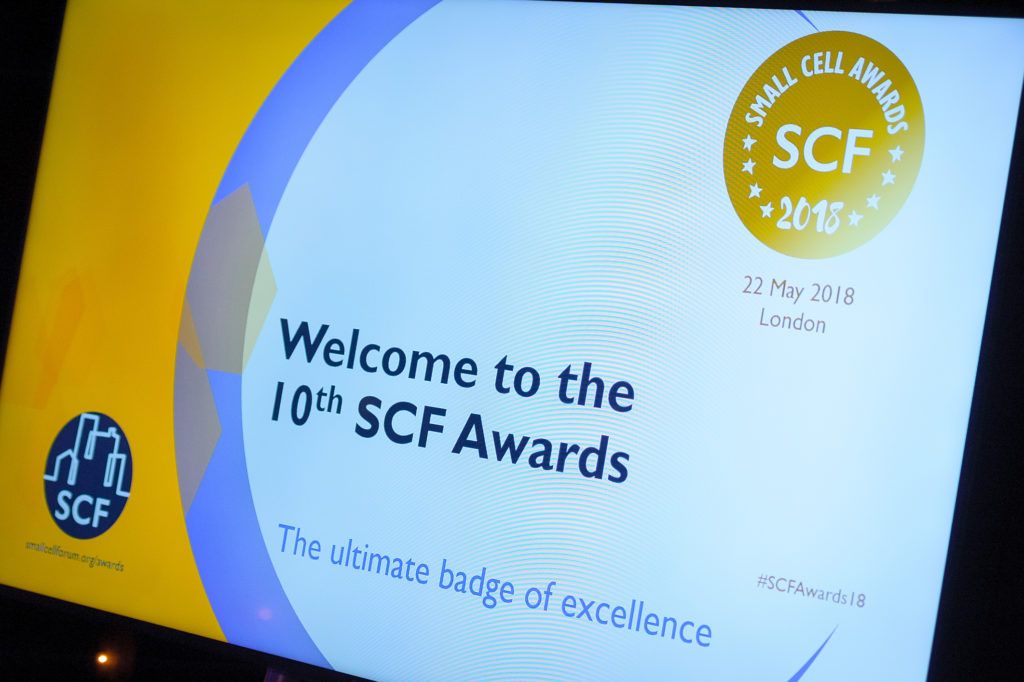In this blog, chair of the Small Cell Awards judging panel, Caroline Gabriel, gives her thoughts on the 2018 award entries and winners.
The SCF Small Cell Awards 2018 were announced this week at a glittering gala event, held during the SCWS conference in London, the biggest annual gathering of the industry. There was a record number of entries, and even more clearly than usual, the shortlists and winners reflected the increasing maturity and diversity of this market.
As chair of the panel of judges – made up of 10 highly experienced industry analysts in the mobile network space – I was honoured to preside over a process which has become deeply respected for its independence and rigour. It is a significant achievement to make it onto an SCF awards shortlist, and all the organizations which did so should be congratulated.
See the full list of winners here.
As one of the original judges of what were then the Femto Forum Awards, back in 2009, I am fascinated by how the categories, and winners, have changed – although some organizations, gratifyingly, are still the same. Some early supporters of small cells won awards this year – Nokia for excellence in commercial deployment (enterprise), for instance; Sprint and Airspan for excellence in commercial deployment (residential); and Airhop for HetNet software and services. But in all three cases, the companies won for technologies which have advanced significantly, like the industry itself, since the early days of small cells.
New categories have been introduced to reflect the expansion of the technology and the use cases, and there has been an increasing emphasis on real commercial impact, as deployments have got larger and more critical, while also retaining the early focus on innovation and new ideas to push the boundaries further.
This year, for instance, we added temporary networks to our rural and remote category, to reflect the rising number of use cases, such as disaster response and large events, in which small cells can provide an efficient solution. The joint winner, Parallel Wireless, has a great deal of experience in this area, and this time, with Ice Wireless, it won for perhaps the ultimate rural and remote deployment, in snowy Alaska. Parallel, with Telefonica, was also the winner of the award for socio-economic impact, for connecting the unconnected in areas of Latin America. This category never changes and is important to remind us that technology delivers more benefits than purely commercial.
There are other changes too. The software and services category has a deeper focus on automation, which is becoming so key to the small cell case. And we introduced a category dedicated to ‘architectures enabling the dense HetNet’, again reflecting how the technology has expanded its scope and is now being deployed in really large-scale networks. This was won by Huawei for an easy-to-install solution for small and medium businesses.
The award for the most competitive category this year went to ‘outstanding innovation in small cell technology or architecture’, which attracted a huge and diverse set of entries. This prize was taken by a first-time winner, Accelleran, whose small cell virtualized RAN solution was a great example of how innovation is driving forward the architecture and preparing for 5G. Another imaginative architectural approach was recognized in the excellence in commercial deployment (urban) category, which was won by CCS with its small cell backhaul system in London.
The judges were particularly interested in entries which supported a neutral host business case, which we see as very important to the growth of small cells. One of these triumphed, with OpenCell taking the prize for outstanding innovation in small cell business case.
The small cell market has been driven from the start by large-scale projects in Asia-Pacific, and the continuing influence of operators in this region was reflected in three awards. Softbank of Japan, with HPE, won the prize for small cell design and technology and Reliance Jio of India won a Small Cell Forum award for contribution to the work of SCF. Also from APAC, the Taiwanese national technology R&D institute, ITRI, was awarded the Judges’ Choice, a special prize with which the panel recognizes an organization whose achievement spans many of the categories. The innovations at ITRI are really extending the definition of a small cell platform.
By the time of next year’s awards, the market will have changed again with initial 5G commercial deployments and a growing number of large densification projects round the world. I’ll look forward to even more and varied submissions in 2019, and would like to congratulate this year’s winners for their outstanding achievements.

